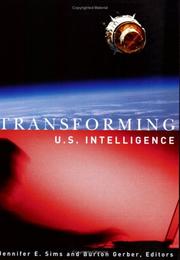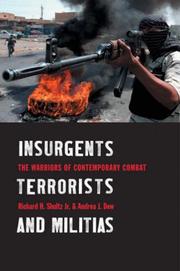| Listing 1 - 2 of 2 |
Sort by
|

ISBN: 1589010698 1589014774 1626167664 1626167648 1626167656 9781626167667 9781626167643 9781626167650 Year: 2020 Publisher: Washington, DC : Georgetown University Press,
Abstract | Keywords | Export | Availability | Bookmark
 Loading...
Loading...Choose an application
- Reference Manager
- EndNote
- RefWorks (Direct export to RefWorks)
"Richard H. Shultz examines the pivotal role of intelligence in twenty-first century irregular warfare through an in-depth examination of the fight against Al-Qaeda in Iraq (AQI) between 2004 and 2009. AQI was the most lethal group that fought the US occupation of the country after the toppling of Saddam Hussein. US Special Operations Command deployed Task Force 714, a joint services counterterrorism force, to Iraq to fight the growing insurgency. TF 714's leader, Maj. Gen. Stanley McChrystal, quickly realized that AQI was unlike any insurgent or terrorist organization that preceded it. AQI was comprised of decentralized networks that employed information age technologies to operate across a broad geographical landscape. This book is the story of how TF 714 had to reinvent itself to destroy the leadership, financial units, communications and media centers, intelligence services, bomb production facilities, and arms acquisition procurers of AQI. Along with changes to operational tempo and command structure, TF 714 altered its methods and practices of intelligence collection, analysis, and covert action. TF 714 is an exemplar of successful organizational learning and how intelligence must lead the way in campaigns against nonstate armed groups"--
INTELLIGENCE SERVICE--USA --- Intelligence service --- United States --- Terrorism --- Iraq War, 2003-2011 --- Irregular warfare. --- Military intelligence --- IW (Irregular warfare) --- Unconventional warfare --- War --- Guerrilla warfare --- Anglo-American Invasion of Iraq, 2003-2011 --- Dawn, Operation New, 2010-2011 --- Gulf War II, 2003-2011 --- Iraqi Freedom, Operation, 2003-2010 --- New Dawn, Operation, 2010-2011 --- Operation Iraqi Freedom, 2003-2010 --- Operation New Dawn, 2010-2011 --- Operation Telic, 2003-2011 --- Persian Gulf War, 2003-2011 --- Telic, Operation, 2003-2011 --- War on Terrorism, 2001-2009 --- Anti-terrorism --- Antiterrorism --- Counter-terrorism --- Counterterrorism --- Prevention. --- Qaida (Organization) --- United States. --- United States Joint Special Operations Command --- U.S. Joint Special Operations Command --- JSOC (U.S.) --- U.S. Special Operations Command --- Qāʻidah (Organization) --- Quaida (Organization) --- Al-Qaida (Organization) --- Qaeda (Organization) --- International Islamic Front for Jihad Against Jews and Crusaders --- Islamic Salvation Foundation --- Group for the Preservation of the Holy Sites --- Islamic Army for the Preservation of Holy Sites --- Islamic Army for the Preservation of the Holy Places --- Al Qaeda (Organization) --- Al Queda (Organization) --- Alʹ-Kaida (Organization) --- Kaida (Organization) --- R̄ekxirawî Elqaʻîde --- Elqaʻîde (Organization) --- تنظيم القاعدة --- قاعدة (منظمة) --- Al-Qaedah (Organization)

ISBN: 9780231129831 9780231129824 0231129823 0231503423 0231129831 9780231503426 Year: 2006 Publisher: New York : Columbia University Press,
Abstract | Keywords | Export | Availability | Bookmark
 Loading...
Loading...Choose an application
- Reference Manager
- EndNote
- RefWorks (Direct export to RefWorks)
Since the end of the Cold War, conventional militaries and their political leaders have confronted a new, brutal type of warfare in which non-state armed groups use asymmetrical tactics to successfully fight larger, technologically superior forces. In order to prevent future bloodshed and political chaos, it is crucial to understand how these unconventional armed groups think and to adapt to their methods of combat. Richard H. Shultz Jr. and Andrea J. Dew investigate the history and politics of modern asymmetrical warfare. By focusing on four specific hotbeds of instability-Somalia, Chechnya, Afghanistan, and Iraq-Shultz and Dew conduct a careful analysis of tribal culture and the value of clan associations. They examine why these "traditional" or "tribal" warriors fight, how they recruit, where they find sanctuary, and what is behind their strategy. Traveling across two centuries and several continents, Shultz and Dew examine the doctrinal, tactical, and strategic advantages and consider the historical, cultural, and anthropological factors behind the motivation and success of the warriors of contemporary combat. In their provocative argument, Shultz and Dew propose that war in the post-Cold War era cannot be waged through traditional Western methods of combat, especially when friendly states and outside organizations like al-Qaeda serve as powerful allies to the enemy. Thoroughly researched and highly readable, Insurgents, Terrorists, and Militias examines how non-state armies fight, identifies the patterns and trends of their combat, and recommends how conventional militaries can defeat these irregular yet highly effective organizations.
Polemology --- anno 2000-2009 --- Iraq --- Chechnia --- Somalia --- Afghanistan --- Militia. --- Paramilitary forces. --- World politicsHistory --- Militia --- Asymmetric warfare --- Insurgency. --- Military art and science --- Terrorism. --- World politics --- Acts of terrorism --- Attacks, Terrorist --- Global terrorism --- International terrorism --- Political terrorism --- Terror attacks --- Terrorist acts --- Terrorist attacks --- World terrorism --- Direct action --- Insurgency --- Political crimes and offenses --- Subversive activities --- Political violence --- Terror --- Forces, Paramilitary --- Paramilitaries --- Armed Forces --- Insurgent attacks --- Rebellions --- Civil war --- Revolutions --- Government, Resistance to --- Internal security --- History --- Terrorism --- Paramilitary forces --- Guerrilla warfare --- Military history, Modern --- 855.5 Gewapende groeperingen --- Militias (Paramilitary forces) --- Private militias --- World politics - 1989 --- -Military history, Modern - 20th century --- Military history, Modern - 21st century
| Listing 1 - 2 of 2 |
Sort by
|

 Search
Search Feedback
Feedback About UniCat
About UniCat  Help
Help News
News